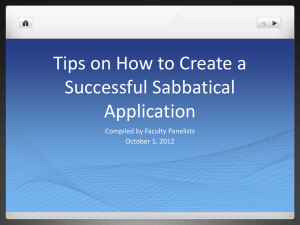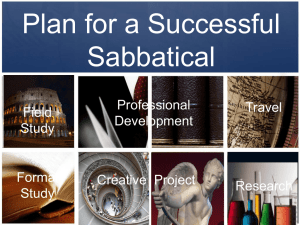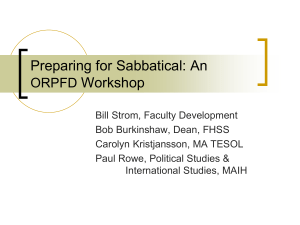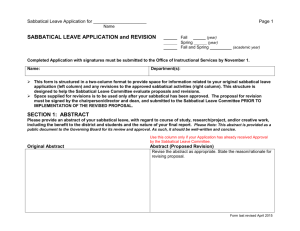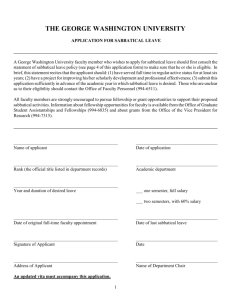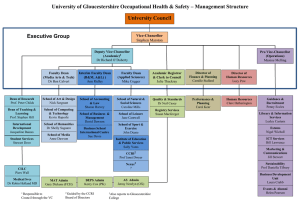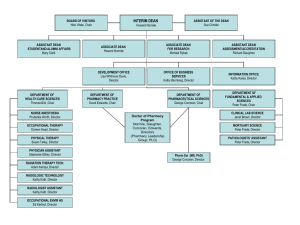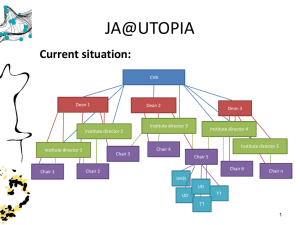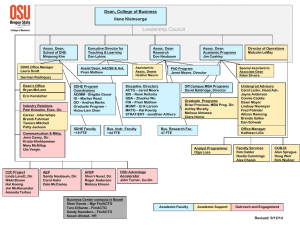NHS Sabbatical Leave Workshop PowerPoint
advertisement
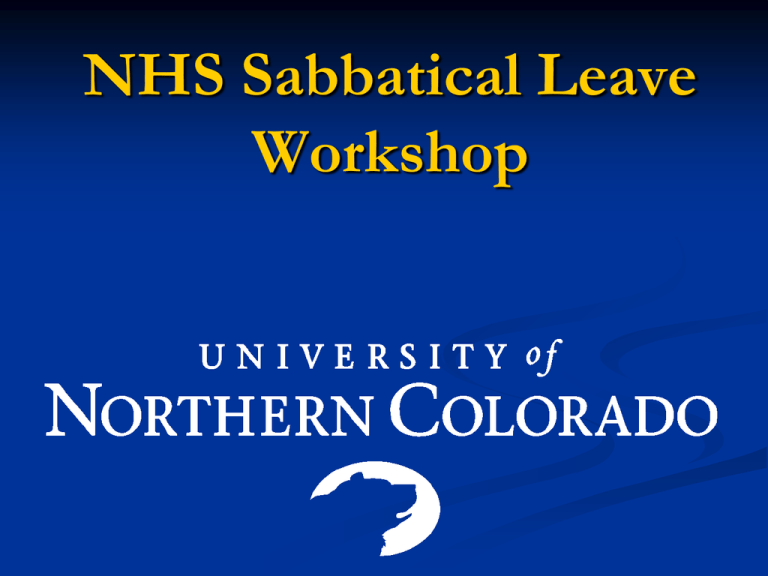
NHS Sabbatical Leave Workshop Purpose of Sabbatical Leave • “The sabbatical leave program is designed to provide an opportunity for growth and renewal for tenured faculty members. Sabbatical leaves must be for the manifest, demonstrable benefit of the University in meeting its responsibilities of teaching, scholarly and other professional activities, service and the advancement of knowledge and must contribute to the further development of an individual as a teacher-scholar. ” • Board Policy Manual, sections 1-1-309 & 2-3-1001 • University Regulation 3-3-1001(1) Eligibility for Sabbatical Tenured and tenure-track faculty • In sixth year of full-time service, leave to occur in seventh or subsequent years • Only tenured faculty are eligible, TT must be granted tenure to take leave • New service count begins after completion of sabbatical; a full-time faculty member is eligible to apply during the sixth year of full-time service after completion of a sabbatical • Service count begins on hire date anniversary. One semester service counts as half year • Employment beyond the academic year does not count as service unless contract so specifies • Leave without pay or full-time administrative work do not count toward timein-service. LWP may count if previously approved by Unit Leader and Dean prior to the commencement of the leave Eligibility for Sabbatical Part-time tenured faculty • Receive prorated credit toward eligibility that is proportional to FTE assignment - 2 semesters @ 0.5 FTE = 1 semester time in service Term faculty • Ineligible • If converted to tenure track, must have years of service credited toward sabbatical leave approved by Unit Leader, Dean, and CAO at time of conversion. Acceptable Sabbatical Proposals • The pursuit of research or study at an institution of higher education or similar entity where improvement of oneself as a teacher-scholar is the focus • The pursuit of research projects within a faculty member’s specialty to advance knowledge, improve the “state of the art,” or to produce material for publication • The acquisition of practical experience within a discipline that will directly enhance the individual’s oncampus responsibilities • The pursuit of special studies or projects for the purpose of expanding institutional-related services beyond the faculty member’s obligations Unacceptable Sabbatical Proposals • Study at a university, the primary purpose of which is to gain a degree in an area or discipline not related to current responsibilities • Travel which is not directly related to on-campus responsibilities. (A significant distinction is made herein between travel to improve oneself as a teacher-scholar and travel in and of itself) • Any sabbatical request within the faculty member’s current obligations to the University. (Examples include rewriting of course materials, course development, and the like) • Activities or research not related to current oncampus responsibilities Restrictions on Sabbatical Leaves • May not be a terminal leave or be taken in last year of employment • May not immediately precede or follow an unpaid leave • May not unduly disrupt student academic programs, as determined by the dean and department chair/school director • Shall not be used as a means to augment personal income Approval of Sabbatical • Based on merits of proposal communicated by the specific goals and plan for achievement outlined in the proposal • Dependent on availability of resources and staffing considerations • No guarantee that sabbatical leaves will be granted in a given academic year Special Note on Leave Duration 2012-2013 Proposals • From the Provost’s office: • Applications for both full-year and one semester sabbatical leaves will be accepted this year. • Instructional replacement costs for one semester sabbatical leaves will need to be funded by the program or college. Salary During Sabbatical • One Semester Leave Full Pay (No salary savings) • Academic Year Leave 60% Academic Year Base Salary (Salary savings reverting back to college to pay for instructional needs) • May not receive compensation for overload • Must repay university by working full-time for one academic year after sabbatical leave or immediately refund the sabbatical remuneration (salary & benefits) Application & Approval Process and Procedures Board Policy Manual 2-3-1001(5) • University application found at http://www.unco.edu/provost/forms/appforleave.pdf • Submit application and NHS attachment (5 pages max), plus a current CV to Unit Leader according to unit deadline. • Unit Leader will call a meeting of tenured and tenure-track faculty to consider the proposal for approval/disapproval using procedures established by the unit based on the merits of the proposal according to the standards of the discipline as well as resource and/or staffing issues • Voting Faculty • All full-time tenured and tenure-track faculty in the program area, department or school will participate in review and evaluation of faculty in their discipline but only tenured faculty must participate in voting; each tenure-track faculty member may choose to vote or not. Tenured faculty in the program area who are on full-time administrative assignment may not vote. Nor shall term faculty vote. Application & Approval Process and Procedures (cont.) Board Policy Manual 2-3-1001(5) • If faculty vote for approval, Unit Leader will submit faculty’s recommendation and Unit Leader’s recommendation to the Dean by November 9, 2012 (If the proposal is not recommended for approval at any level and is not withdrawn by the faculty member, it will be retained for reporting purposes.) • Dean will submit Unit recommendations and Dean’s recommendation to the university chief academic officer • CAO will make final decision and report such decision to the Board of Trusties and to the President • Applicants will be informed of the recommendations and be afforded an opportunity to respond at each level of the review process up to the CAO, whose decision is final Supplement to Sabbatical Leave Application NHS Guidelines (≤ 5 pages) • Detail specific goal(s) and plan(s) for achievement • Show the relationship of the activities to be pursued to the individual’s on-campus responsibilities • Specify the effect on the applicant’s professional growth and development of knowledge in the discipline • Show how the activities will influence the student’s educational experience and enhance the University’s reputation • Detail the expected cost of leave, as well as how the leave will impact program staffing, and student progression towards degree in applicant’s program • Identify the period of time since the last sabbatical leave and whether the proposal has been previously postponed. Proposal Prioritization Process CAO prioritizes proposals based on: 1. Time sensitivity – work must be done by end of following academic year or it cannot be completed; detail justification in proposals 2. Proposals that have been postponed in favor of more timesensitive proposals take precedence – detail previous postponements in proposals 3. Duration between sabbaticals – longest take precedence over shortest; detail the period of time since the last sabbatical leave or since the time of hire 4. When a leave is postponed for any reasons, eligibility for the next sabbatical leave is calculated as if the postponement has not occurred. Timeline November 9, 2012: Director’s/Chair recommendation to NHS Dean December 10, 2012: Deans recommend sabbatical leaves to Provost January 14, 2013: Provost recommends sabbatical leaves to President February 11, 2013: President’s recommendations returned to Provost March 8, 2013: Provost announces sabbatical leaves to the Board of Trustees Delay of Sabbatical Leave • Delay of Leave by Faculty Member • If apply for and granted sabbatical leave, but not able to take at specified time • May request postponement of leave for up to one year • Requires recommendation of Unit Leader and Dean • Delay of Leave by Dean • May change effective dates of leave • May not postpone leave for more than one year from the requested start date, unless the faculty member agrees Proposal Revisions • Must submit proposed revisions to Unit Leader and Dean for approval • If either Unit Leader or Dean does not approve, faculty member will be provided opportunity to provide additional information • General expectation is that work will be done as proposed • Final report must match proposed objectives unless a revised proposal has been approved Final Report Expectation • Required written report to program area, department or school faculty (no more than 5 pages) • Detail activities, goals attained, and benefits to university that reflect the approved proposal or proposal revision • Reviewed by Faculty, Unit Leader, Dean, and CAO • Must be submitted within one academic year after completion of sabbatical • Unacceptable reports will result in ineligibility for subsequent sabbaticals • Failure to submit report w/in one year • Failure to pursue sabbatical activities as proposed • Failure to address how sabbatical leave met the appropriate uses of sabbatical leave (Board Policy 2-3-1001(3)) Institutional Accountability • Joint Budget Committee • Education Committees of the Colorado Senate and House of Representatives • Colorado Commission on Higher Education • Colorado Open Records Statute Questions?
